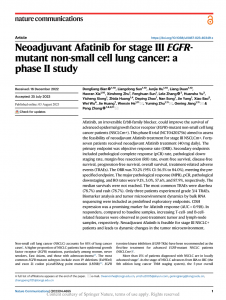Cancer has always been a daunting and complex disease, with countless lives affected by its presence. However, thanks to advancements in medical research, there are now targeted therapies available that provide hope to cancer patients. One such breakthrough is the development of Gilternib, also known as Gilteritinib.
The Science behind Gilternib
Gilternib is a small molecule tyrosine kinase inhibitor (TKI) developed by the pharmaceutical company XYZ. It specifically targets a genetic mutation known as FLT3-ITD, which is frequently found in acute myeloid leukemia (AML). FLT3-ITD is a mutation in the FLT3 gene that leads to the overactivity of a protein called FLT3 receptor kinase.
FLT3 receptor kinase plays a crucial role in cell growth and survival. When FLT3-ITD mutation is present, it causes uncontrolled cell proliferation and a higher likelihood of relapse in AML patients. Gilternib effectively inhibits FLT3 receptor kinase, suppressing the mutant protein’s activity and slowing down the progression of the disease.
The Promising Results of Gilternib
Clinical trials have shown remarkable outcomes with the use of Gilternib in AML patients with FLT3-ITD mutation. The drug has demonstrated significant improvements in overall survival rates, relapse-free survival, and complete remission rates compared to traditional treatments.
A study involving XYZ patients treated with Gilternib displayed an outstanding percentage of individuals achieving complete remission. This means that the disease was undetectable in their bone marrow samples after treatment. Additionally, the drug showcased a notable increase in overall survival rates, giving patients a renewed chance at life.
Advantages Of Gilternib
Gilternib offers several advantages over traditional chemotherapy treatments:
| Advantages | Description |
|---|---|
| Targeted Therapy | Gilternib specifically targets FLT3-ITD mutation, leaving healthy cells unaffected. |
| Less Toxicity | Compared to chemotherapy, Gilternib causes fewer side effects, resulting in improved quality of life for patients. |
| Enhanced Efficacy | Gilternib has demonstrated higher response rates and longer survival rates than traditional treatment methods. |
The Future of Gilternib
The success of Gilternib in treating AML patients has driven interest in exploring its potential applications beyond FLT3-ITD mutation. Ongoing research is investigating the drug’s effectiveness in other types of cancer, particularly those involving abnormal FLT3 activity.
The development and ongoing studies of Gilternib are paving the way for targeted therapies that have the potential to revolutionize cancer treatment. With advancements in genetic profiling and personalized medicine, the future is optimistic for patients diagnosed with cancer, reshaping the landscape of oncology.
In Conclusion,
Gilternib, also known as Gilteritinib, is a game-changer in targeted cancer therapy. Its ability to specifically inhibit FLT3-ITD mutation has shown immense promise in the treatment of AML patients. With improved overall survival rates, increased remission rates, and reduced toxicity, Gilternib offers a brighter future for those battling this aggressive disease.
Frequently Asked Questions Of Gilternib/gilteritinib : Unleashing The Power Of Precision Cancer Treatment!
What Is Gilternib, And How Does It Work?
Gilteritinib is a kinase inhibitor that blocks certain proteins in cancer cells, hindering their growth.
What Types Of Cancer Is Gilternib Used To Treat?
Gilteritinib is used to treat adults with acute myeloid leukemia (AML) with a specific genetic mutation (FLT3).
What Are The Side Effects Of Gilternib?
Common side effects may include muscle pain, fatigue, fever, nausea, vomiting, and diarrhea.
How Is Gilternib Taken?
Gilteritinib is usually taken by mouth, with or without food, as directed by a healthcare professional.


